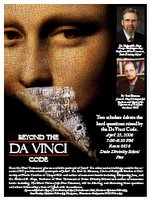Socratics,
It was an interesting day yesterday. We had the opportunity to meet and talk with Daniel Dennett. Here are a couple of thoughts given the experience:
1. Dennett was considerably more personable and civil than I was expecting. I was surprised since his books, particularly
Breaking the Spell, is so polemical against religions and Christianity. But he was quite easy to talk with. His head was not in the clouds. He was not arrogant. He was not pushy. He was a good listener and seemed geniunely interested in having a conversation with us. I think this goes to show that the boxes we put people in rarely ever fit.
2. I found generally his description of Christians (and thus I would suspect of other religious individuals) quite thin at times. I rarely found myself in his descriptions of Christians. I think he assumed that Christians don't think, don't ask questions, never ask why they believe what they believe, and are generally content to be told what to believe by their leaders. After working in a church for 8 years, I can genuinely say that I wish Christians were so maleable. It would have made my job so much easier! Yet I had to on a regular basis explain and defend almost every decision or belief. Rarely was I met with total resignation to whatever I thought. I will give a further example of his thin description of Christians below.
3. During our time with him (in which there were only about ten of us at the Div School) I asked him the following question: On Pg 512 you say, “Bach is precious not because he had within his brain a magic pearl of genius-stuff, a skyhook [a magical supernatural gift], but because he was, or contained, an utterly idiosyncratic structure of cranes, made of cranes, made of cranes, made of cranes [one biological process built on top of another biological process, etc...].” I wonder whether this is not creating a “turtles all the way down” kind of solution. On what ground does the first crane stand? (for a reference explaining "turtles all the way down" see
http://members.tripod.com/TheoLarch/turtle.html). He agreed that Darwin has these kind of problems but suggested the solution then went back to cosmology. In other words, there have been many, many universeses and this was the first one that worked to create us. It seemed to me that he only pushed the "turtles all the way down" from biology to cosmology. He did end up saying something to the effect that there is a problem with this but added that if the only role that God played was that there was something rather than nothing, that was an awefuly small God. The more I've thought about his conclusion about God's role (assuming that is all that God's role is, for the moment), the less I agreed with his valuation of it. The something we have in the universe is quite an amazing something. If all that God did was cause this something to exist rather than not exist, then does it not follow that this God is even greater than (or at least as great as) the universe? This sounds pretty awe-inspiring to me.
4. Lastly, after his big lecture to 500 people I wrote him the following email:
Dear Dr. Dennett,
Thanks again for coming to visit with our group at Duke Divinity School.
I did want to add one thing after your lecture. I am a graduate of Wheaton College and would suggest that gives me some experience to speak on what evangelicals (as a sub-group of Christianity) might mean when they say something like what was on the sign of the Baptist church which you had a picture of in your lecture (“Morality Without God Equals 0”). They mean one of two things (neither of which you thought they meant):
1. Good works are not enough to earn God’s love (or heaven, or salvation)
2. Morality without God has no logical foundation.
It does not mean as you suggested: Atheists are immoral (though it may mean that atheists act illogically when they act morally or value morality). In fact, a considerable amount of the history of Christian theology is an attempt to understand why people who are not Christians act morally. This can be seen in Thomas Aquinas’ appropriate of Aristotle’s cardinal virtues, John Calvin’s concept of common grace, and John Wesley’s theology of prevenient grace among others. Therefore, I’d suggest that the course of Christian history (and theology) is not what you suggest it is: telling atheists they are immoral people who necessarily act in immoral ways. Nor would I ever want to be characterized as telling you that you act immorally because you are an atheist (in fact, I found your interaction with us very civil and personable and enjoyable). I know plenty of people who are “brights” [Dennett's self-made word for Athiests] who are very moral people.
Again, I greatly appreciated the very unique opportunity we had to talk with you today. I hope it was meaningful for you as well.
So these are my thoughts on Dennett and I appreciate the Blog Master's giving us this space to rant and rave. I look forward today to meeting with Dr. Heutter then our second Pub Night.
Peace and grace,
Tom
 As the only other person with a title, besides the King, I would like to put out a call for links and/or other stuff people want up here on our pitifully budgeted blog (King: we need a budget, where are those fees going?)
As the only other person with a title, besides the King, I would like to put out a call for links and/or other stuff people want up here on our pitifully budgeted blog (King: we need a budget, where are those fees going?)

